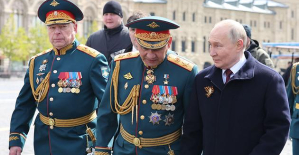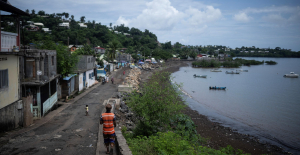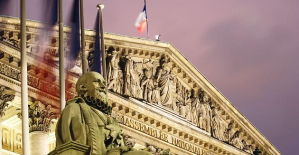“In a world where size and weight matter, it is clearly in Europe’s strategic and security interests to complete our Union.” On Wednesday, in Strasbourg, Ursula von der Leyen justified and prepared minds for a Europe “of more than thirty”. A formula that the President of the European Commission used several times in her speech on the State of the Union - the last one before the European elections in June 2024.
Enlargement is existential for the future of the EU. And a lot will happen in the coming months. The Commission must deliver its opinions at the end of October on the advisability of opening accession negotiations for the entry of Ukraine, Moldova, Georgia and the Western Balkan countries into the EU. The Twenty-Seven, who will have a first exchange on the subject in Granada at the beginning of next month, will decide on the next steps at the end of December.
Also readSweden, the real sick man of Europe
Candidate countries have a few weeks left to move forward with the requested reforms. “VDL” did not venture to give a timetable, unlike the President of the European Council, Charles Michel, who spoke of “a 2030 horizon”, but it nevertheless called on the EU to respond “to the call of history” and to prepare now for the enormous consequences that the entry of new countries would have.
For “VDL”, it is not possible to wait for a hypothetical change in the treaties which will in any case be very difficult to achieve and which is not the preference of the Twenty-Seven. Not to mention that this debate would parasitize the upcoming elections and give fodder to the populists. “This will involve the organization of a European convention and a modification of the treaties. But we cannot – and we should not – wait to modify the treaties to move forward on the path to enlargement,” she stressed, saying she was convinced that “the EU will work with more than 30”.
The Commission will therefore launch preparatory work with the “pre-enlargement reviews of EU policies”. Objective: “to determine whether and how each policy area should be adapted with a view to enlarging the Union”. The key: changes in financial flows between the EU and the Member States, whether the common agricultural policy (CAP) or cohesion, which represent a total of 60% of the European budget. The awakening could be painful, especially for France. “There is no longer a CAP and only one beneficiary for the cohesion funds: Ukraine,” said a European diplomat. The question of the EU's budgetary means to “absorb” these countries will also arise, particularly in terms of defense and security.
“VDL” also wants to see the Member States and the European Parliament take advantage of the 300 days that separate them from the elections to complete all the texts still on the table. As the economy slows in the bloc, the president of the European Commission has positioned herself on the side of businesses, admitting that the "green deal" - her Commission's mantra since 2019 - must not hamper the competitiveness of the EU. Moreover, as she announced, the Italian Mario Draghi is entrusted with a report on this last subject.
Added to this, the trade agreements with Australia, Mexico and Mercosur, or the migration and asylum pact which must be completed while arrivals are now at the level of those experienced by the Union during the 2015-2016 crisis, the mid-term budget review which notably provides for aid of 50 billion over four years for the reconstruction of Ukraine. Given public concerns, this will undoubtedly be a key subject of the campaign. “Let’s show that Europe can manage migration effectively and compassionately. Let’s finish the job!” urged “VDL”. Other issues have, on the contrary, been passed over in silence: the difficult revision of the stability and growth pact that the Europeans must achieve before the end of the year, the reform of the electricity market on which oppose France and Germany.
Also read What Europe after the war in Ukraine?
During her speech, Ursula von der Leyen was keen to demonstrate that the reconstitution of the blocs and the successive crises had contributed to building a “geopolitical Union” since 2020, supporting Ukraine, opposing Russia, recalling the importance of Africa for Europeans, defending its interests including by being much more assertive against China. Putting words into action, the President of the Commission announced on Wednesday the opening of an investigation into Chinese subsidies for electric cars which are flooding the European market. “Europe is open to competition. Not a race to the bottom,” she explained.

 Gaza: under the spotlight, the Israeli-Palestinian conflict shakes up the Eurovision contest
Gaza: under the spotlight, the Israeli-Palestinian conflict shakes up the Eurovision contest Black soldier killed by a police officer in the United States: the sheriff publishes the video of the arrest
Black soldier killed by a police officer in the United States: the sheriff publishes the video of the arrest In Malmö, the Eurovision party transformed into entrenched camps
In Malmö, the Eurovision party transformed into entrenched camps In Russia, Vladimir Putin stigmatizes “Western elites”
In Russia, Vladimir Putin stigmatizes “Western elites” “Mediterranean diet” or “DASH”, two good tips for eating better
“Mediterranean diet” or “DASH”, two good tips for eating better Fatal case of cholera in Mayotte: the epidemic is “contained”, assures the government
Fatal case of cholera in Mayotte: the epidemic is “contained”, assures the government The presence of blood in the urine, a warning sign of bladder cancer
The presence of blood in the urine, a warning sign of bladder cancer A baby whose mother smoked during pregnancy will age more quickly
A baby whose mother smoked during pregnancy will age more quickly The government launches a consultation on birth leave
The government launches a consultation on birth leave Netflix, Disney ... 7,000 French artists demand better remuneration from streaming platforms
Netflix, Disney ... 7,000 French artists demand better remuneration from streaming platforms The government plans a merger of French public broadcasting in 2026
The government plans a merger of French public broadcasting in 2026 “Choose France”: more than 15 billion in foreign investments made official
“Choose France”: more than 15 billion in foreign investments made official Planet of the Apes tops the North American box office
Planet of the Apes tops the North American box office The Roman Polanski-Charlotte Lewis face-to-face before French justice on Tuesday
The Roman Polanski-Charlotte Lewis face-to-face before French justice on Tuesday Films created by artificial intelligence now have their festival
Films created by artificial intelligence now have their festival Disappearance of Nikus Pokus, member of the rap group Svinkels
Disappearance of Nikus Pokus, member of the rap group Svinkels Omoda 7, another Chinese car that could be manufactured in Spain
Omoda 7, another Chinese car that could be manufactured in Spain BYD chooses CA Auto Bank as financial partner in Spain
BYD chooses CA Auto Bank as financial partner in Spain Tesla and Baidu sign key agreement to boost development of autonomous driving
Tesla and Baidu sign key agreement to boost development of autonomous driving Skoda Kodiaq 2024: a 'beast' plug-in hybrid SUV
Skoda Kodiaq 2024: a 'beast' plug-in hybrid SUV The home mortgage firm rises 3.8% in February and the average interest moderates to 3.33%
The home mortgage firm rises 3.8% in February and the average interest moderates to 3.33% This is how housing prices have changed in Spain in the last decade
This is how housing prices have changed in Spain in the last decade The home mortgage firm drops 10% in January and interest soars to 3.46%
The home mortgage firm drops 10% in January and interest soars to 3.46% The jewel of the Rocío de Nagüeles urbanization: a dream villa in Marbella
The jewel of the Rocío de Nagüeles urbanization: a dream villa in Marbella Diving into the secrets of the National Assembly
Diving into the secrets of the National Assembly Institutions: senators want to restore the accumulation of mandates and put an end to the automatic presence of ex-presidents on the Constitutional Council
Institutions: senators want to restore the accumulation of mandates and put an end to the automatic presence of ex-presidents on the Constitutional Council Europeans: David Lisnard expresses his “essential and vital” support for François-Xavier Bellamy
Europeans: David Lisnard expresses his “essential and vital” support for François-Xavier Bellamy Facing Jordan Bardella, the popularity match turns to Gabriel Attal’s advantage
Facing Jordan Bardella, the popularity match turns to Gabriel Attal’s advantage These French cities that will boycott the World Cup in Qatar
These French cities that will boycott the World Cup in Qatar Football: a Barça supporter tried in Paris in June for a Nazi salute
Football: a Barça supporter tried in Paris in June for a Nazi salute Ligue 1: FC Nantes breaks a sad record
Ligue 1: FC Nantes breaks a sad record PSG: whistled by supporters, Kurzawa responds abruptly on Instagram
PSG: whistled by supporters, Kurzawa responds abruptly on Instagram Rugby: “You push people to suicide”, Danny Cipriani attacks the tabloid press after a new article
Rugby: “You push people to suicide”, Danny Cipriani attacks the tabloid press after a new article


















